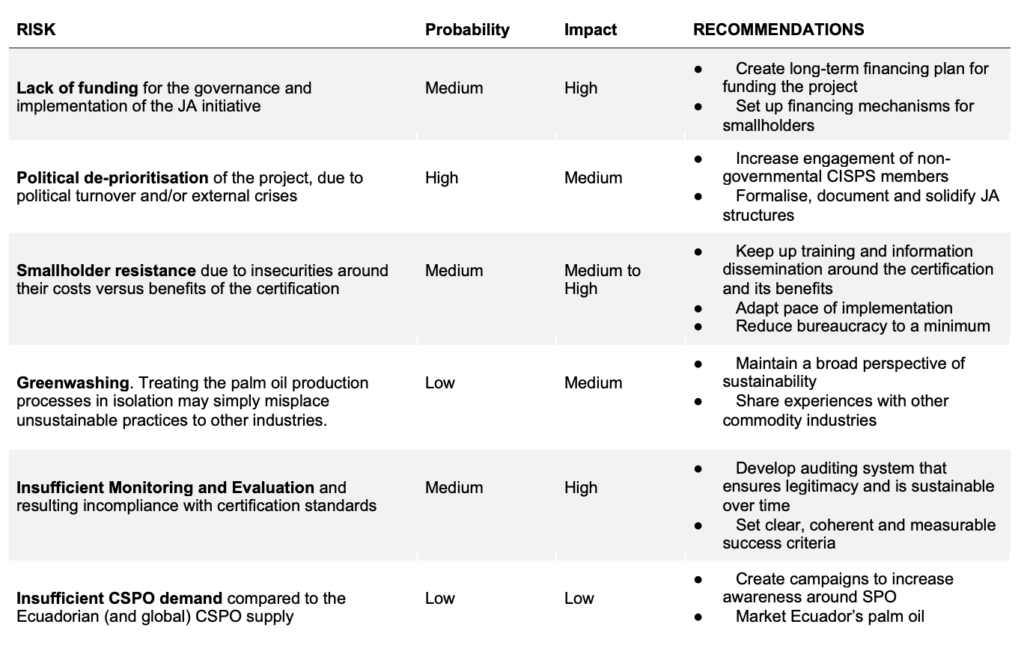By Mathilde Birn, Sanne Qvarfordh, & Dr. Kristjan Jespersen
◦ 3 min read ◦
Sustainability certifications have become a widely used mechanism to signal to consumers that a product was ostensibly produced sustainably. Nevertheless, such certifications typically fail to scale beyond at most a fifth of global production. Within the palm oil sector, widely known as a major deforestation driver, the Roundtable for Sustainable Palm Oil (RSPO)’s Jurisdictional Approach is one of a growing number of examples of upscaling strategies. Under the Jurisdictional Approach, all value-chain actors within a province or even an entire country would be certified simultaneously. Ecuador is piloting the initiative at the national scale and is currently developing a national commitment.
The research is informed by 21 interviews with a variety of actors in the Ecuadorian palm oil sector. After qualitatively coding these interviews and looking for common patterns, we identified four main motivations behind Ecuadorian interest in jurisdictional palm oil certification. First, interviewees reported a concern that Ecuador risked losing market access due to sustainability-related import restrictions and consumer preferences in certain markets. Second, 90% of Ecuador’s palm oil producers are smallholders, whose resource limitations make it difficult to achieve RSPO certification on their own. Under the Jurisdictional Approach, smallholders would be grouped together, allowing them to pool resources and share costs. Third, the Jurisdictional Approach facilitates governmental sponsorship for smallholder capacity building. Fourth, previous experience and institution-building around sustainability in general and anti-deforestation in particular produced forward momentum on the part of the civil society and the Ecuadorian government that has led to an institutional infrastructure favourable to ideas like the Jurisdictional Approach.
In the most optimistic scenario, the Ecuadorian government’s commitment to the Jurisdictional Approach, strengthened by multi-stakeholder support, could encourage more sustainable production practices. However, we also identified certain risks associated with the implementation of the initiative. These risks especially significant given the Jurisdictional Approach’s relative novelty. As one interviewee put it: “we have been flying the plane while we’re building the plane”.
We have identified six key risks to Ecuador’s implementation of the RSPO Jurisdictional Approach and paired them with mitigation recommendations. This list is certainly not exhaustive and ought to be further assessed and developed by local stakeholders equipped with relevant expertise.

The Jurisdictional Approach affects several different stakeholder groups with diverse interests that must be actively engaged in the process to achieve success. To this end, efforts should be made to include representatives of stakeholders that are currently missing (or insufficiently represented) in the governance structure of the RSPO Jurisdictional Approach in Ecuador. These stakeholders include academia (which was involved in the beginning of the process but no longer is), domestic civil society organizations, local communities (including Afro-Ecuadorian and indigenous peoples), local governments, and representatives of the global palm oil industry.
About the Authors
Mathilde Birn graduated from CBS with a BSc and MSc degree in International Business and Politics. Academically, her main interest is within the field of sustainable development and the impact of stakeholder dynamics on such development, with a focus on emerging economies.
Sanne Qvarfordh graduated from CBS with a BSc. and a MSc. degree in International Business and Politics. Her main academic interest is sustainable development in emerging economies, with a focus on multi-stakeholder initiatives in Latin America.
Kristjan Jespersen is an Associate Professor at the Copenhagen Business School. He studies on the growing development and management of Ecosystem Services in developing countries. Within the field, Kristjan focuses his attention on the institutional legitimacy of such initiatives and the overall compensation tools used to ensure compliance.
Photo by Andrés Medina on Unsplash

